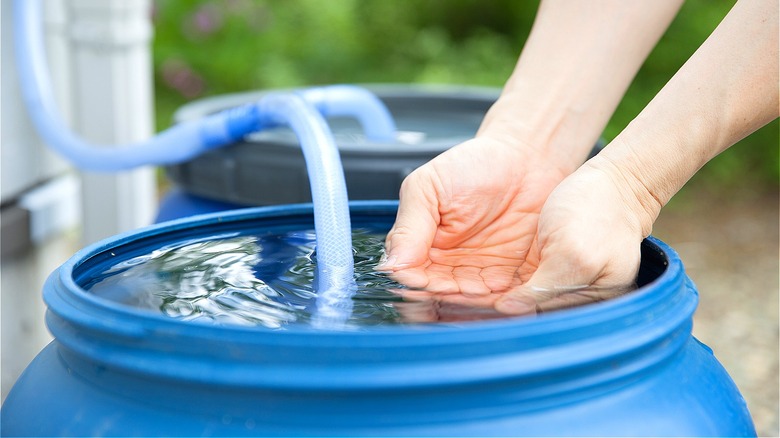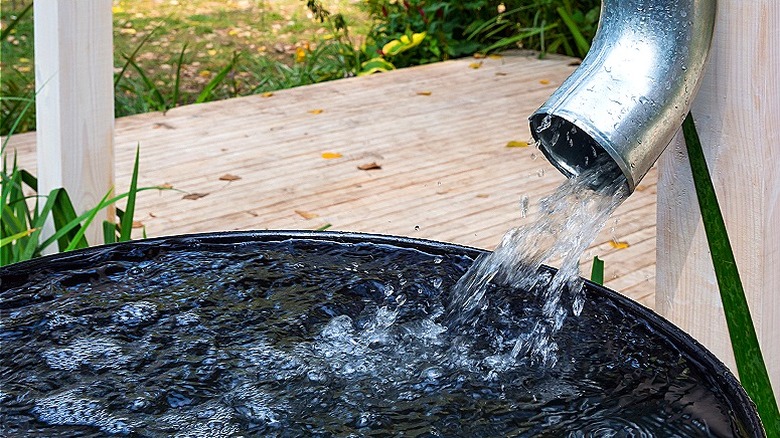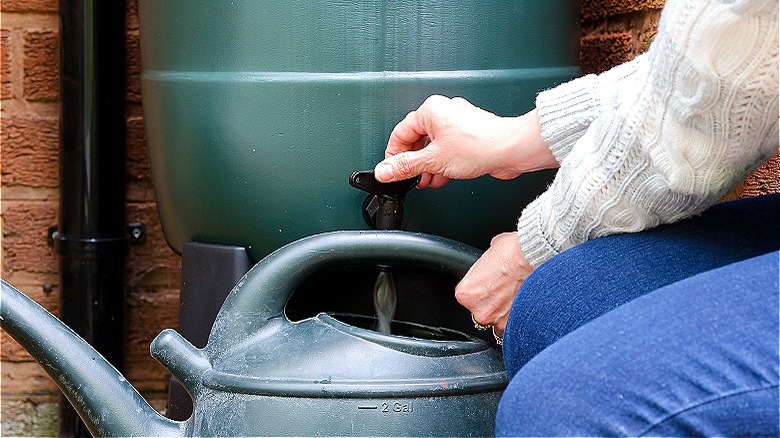You Might Want To Think Twice Before Collecting Rainwater In These Areas
As the world's primary source of water, rainwater is the backbone supporting the existence of life, essential in replenishing the world's bodies of water, keeping vegetation lush and irrigated, and sustaining all living things. As such, it's not out of the ordinary for homeowners to want to catch and preserve rainwater for long-term use, especially if they reside in a region prone to drought and steep utility costs. However, you should know that many areas across the United States regulate this practice.
Though no federal legislation exists regarding rainwater collection in the U.S., nearly half of the 50 states have limitations in place preventing residents from freely collecting rainwater on their properties. But, aside from the standard restrictions detailing how rainwater should be collected and used, no state outright bans its constituents from preserving the substance outside of their homes. Some homeowner's associations also impose their own share of restrictions for aesthetic purposes, so before you begin collecting rainwater in your backyard, check the ordinances and rules that govern your respective city, state, county, and neighborhood to ensure you do so safely and correctly.
State governments may instill restrictions on rainwater collection for many reasons, ranging from pest control to distribution concerns. There's also the shared fear of constituents falling ill from extensive rainwater usage, as the substance may contain bacteria picked up from roofs or gutters during the collection process or if left outside for longer than a few days. Here's more on the intricacies of collecting rainwater, including which U.S. states implement restrictions and what those restrictions look like.
States that limit the collection of rainwater
While a resident's method of collecting rainwater can be as simple as placing a bucket outside their home to catch stray raindrops during a storm, the process can also be more complex than that. Some homeowners choose to invest in rain barrels or rainwater tanks, large, barrel-shaped containers that collect rainwater that falls from a home's roof and hold it for future use. Regardless of how constituents choose to do it, the mere act of preserving rainwater is good for the environment in the sense that it counteracts flooding and benefits your grass and gardens.
States that have instilled limitations or restrictions upon rainwater collection include, but aren't limited to, California, Colorado, Georgia, Nevada, Ohio, Oregon, Texas, Utah, and Vermont. The extent of each of these states' limitations differs, with some requiring homeowners to apply for permits to install rainwater collection devices at home and others prohibiting potable rainwater usage altogether. Some states even leave it up to the individual counties to decide their own restrictions.
Many of the states placing restrictions on the collection of rainwater are located in the western half of the country, which are also the states more likely to experience water shortages when compared to states near and along the East Coast. Many states will also offer monetary incentives to residents who opt to take up rainwater harvesting to compensate for cutbacks on municipal water usage, usually in the form of rebates or discounts on rain barrels and other related equipment.
How local governments restrict rainwater collection
Government limitations on rainwater collection more so dictate how the preserved water should be gathered and used rather than where you should or shouldn't gather it. This said, your local or state governing bodies may prevent you from harvesting rainwater on public property or if you live in a multifamily complex featuring more than a designated number of units.
A common restriction calls for residents to reserve collected rainwater for outdoor usage. In other words, avoid using the water to drink, cook, or perform any other general tasks inside the home. This restriction spawns from health concerns provided by the Centers for Disease Control and Prevention since, despite its purity when it falls from the atmosphere, rainwater has the potential to become contaminated by dirt, chemicals, and other miscellaneous debris upon making contact with your roof, gutter, or rain barrel. Also, leaving rainwater inside your rain barrel or other collection device for extended periods of time only increases your rainwater's susceptibility to germs.
States may also limit the amount of rainwater residents can collect on their respective properties as a way to ensure water remains a readily accessible resource for all inhabitants. This restriction stems from the reasonable use doctrine, which allows residents to access and use water for sensible reasons, so long as their actions don't hinder others from doing the same. The state of Colorado, for example, restricts residents from harvesting more than two 110-gallon-sized rain barrels full of rainwater at a time.


